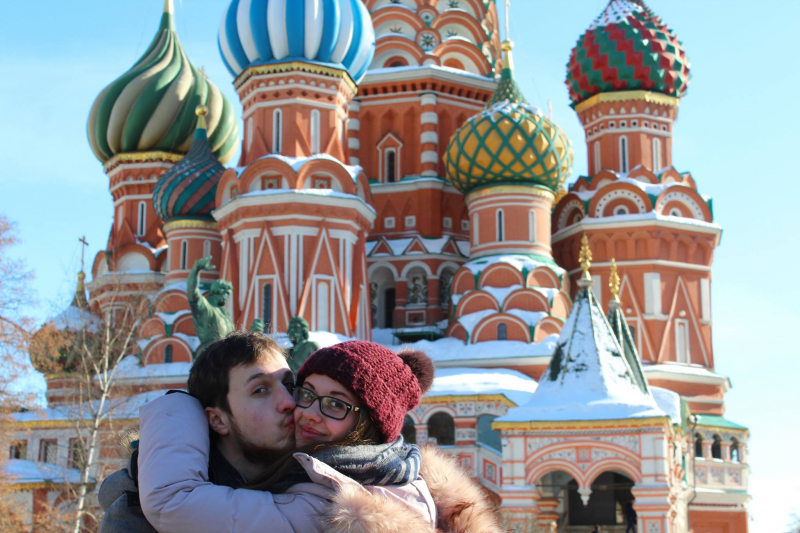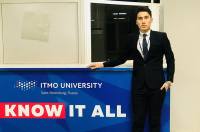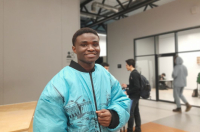What did you think when you first came to ITMO University?
I had the opportunity to attend summer schools in 2016 and 2017. I felt very comfortable here from day one thanks to my colleagues, who warmly welcomed me. I was surprised, in a good way, by the friendly and relaxed atmosphere at the office. In my home country, if you regularly arrive at work 10 minutes late or leave a bit early, that's a legitimate reason to lose your job.
What did you do before coming here? What did you get your Bachelor’s degree in?
I am a second-year Master’s student at the Faculty of Translation and Interpretation at the University of Mons, a city located near the French border. I am studying Russian, English, and I also know some Polish. My specialization is written translation in a multicultural context. That includes international relations, communication strategies, trade, entrepreneurship and so on. Hopefully, I will graduate at the end of this academic year.
Why did you choose translation as your field of study? What was interesting about it?
I know that I've always enjoyed learning foreign languages. I remember when I was younger, I used to listen to English songs and try to understand what they meant, so years later, translation was a relatively easy choice. What I find interesting in translation studies is that I've been fortunate enough to have extremely qualified teachers, to meet very experienced professionals, but also to meet wonderful people who have shared my daily life since the beginning of my studies... I’ve never regretted my choice in five years.
How can this profession help people in the future?
I think that the translator’s profession should be more recognized because people don't realize what an important role translators and interpreters play in today's society. Almost everything around us has been translated: books, websites, computer programs, ads, films, to cite the most common examples. In a way, translators can bring two cultures, two countries, closer together. To me, it’s a form of diplomacy, and the world would be a very sad place if we couldn't interact with other cultures.
How important do you think are friendship and collaboration at university?
I consider friendship and collaboration are important as motivation and hard work. At my university, I think that managing everything on your own, without a friend to guide you and help you out, would be complicated. I don’t know if it is the same here at ITMO. Moreover, I believe that these two values are highly appreciated in the workplace, especially when it comes to working in a team, both in Belgium and in Russia.
If you could choose anyone, who would you pick as your mentor?
That’s a tricky question… As a mentor, I would choose one of my teachers at University (UMONS). She teaches us written and sight translation from Russian into French. She tremendously impresses me with her professional career: she taught at MSU University in Moscow, and at another very reputable University in Brussels, she has written several scientific papers to name but a few of her accomplishments. She knows all the nuances and subtleties of the French and Russian languages, and I think it’s crazy! I'm learning something new in every one of her classes. On a personal level, she's also an incredibly kind, gentle and patient woman.
Do you have any hobbies?
I have to say that the last five years have been all about my studies, friends, and trips. I think traveling is really what I love to do whenever I have time. I am looking forward to graduating and having weekends off to go out, to have family meetings, to rest in my future home. Speaking of which, I love shopping and envisioning my future home.
What are the comments people usually tell you about Belgium?
People often talk about Belgian beers, our chocolate, our national football team, about our football star Eden Hazard, but usually, nothing special. However, two years ago in Yaroslavl, a girl asked me how come I was so thin because in Belgium we only eat fries, chocolate, and drink beer. I didn’t know what to say… Also, my friends and I have been asked to say something in “Belgian”, which is a language that does not exist. And most of the time, people don’t know that we have a king and not a president! (fun fact).
What did you expect when coming to Russia?
I wanted to get a glimpse of what it’s like to work in Russia, because I may work here one day. I also wanted to travel as much as possible, to discover the nearby cities. Unfortunately, I have to admit that I don’t have much free time because of my work schedule and the fact that I have a thesis to write… That’s a good reason to come back to Russia!
What’s your thesis mainly about?
I chose to work on the translation of a cultural study published by Maria Golovanivksaya. Her assumption is that mentality is reflected in language, and her work consists of the comparative analysis of fundamental worldview concepts such as soul, mind, fate or joy in Russia and in France. She is also comparing the two languages. In total, more than fifty concepts are described in each language not only through their semantic meaning but also through their history and etymology.
Are there any misconceptions people generally have about Russia that have proved wrong since you’ve been here?
This is not big news, but people often think Russians are cold, introverted and unsympathetic people. I wish they'd realize how wrong they are. At first glance, it's clear that it can be confusing when they don't smile back at you, but when you get to know them and their perspective on life, you see that Russians are incredibly endearing people. It makes me angry to hear all these clichés coming from people who have never set foot in Russia and who make up their minds based on what they watch on TV.
Why Russia and not any other country?
I wanted to improve my Russian language skills. As strange as it may seem, you can be a very good translator without having an excellent level of the language you work with. Understanding and speaking a language are two completely different things. I think being a translator and having poor language skills is unacceptable. People will take you more seriously, and see you like a more qualified professional. But first of all, it's always a pleasure to come back to Russia. I love this country and its culture, which are so different from what I used to know.
Written by Ethan Avila



